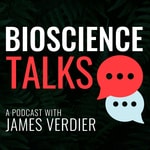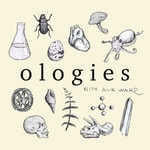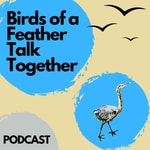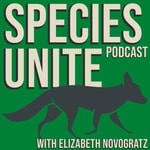BioScience Talks – Details, episodes & analysis
Podcast details
Technical and general information from the podcast's RSS feed.

BioScience Talks
American Institute of Biological Sciences
Frequency: 1 episode/22d. Total Eps: 168

Recent rankings
Latest chart positions across Apple Podcasts and Spotify rankings.
Apple Podcasts
🇩🇪 Germany - naturalSciences
22/06/2025#95🇩🇪 Germany - naturalSciences
21/06/2025#80🇩🇪 Germany - naturalSciences
20/06/2025#77🇩🇪 Germany - naturalSciences
19/06/2025#63🇩🇪 Germany - naturalSciences
18/06/2025#53🇬🇧 Great Britain - naturalSciences
21/05/2025#98🇬🇧 Great Britain - naturalSciences
20/05/2025#81🇬🇧 Great Britain - naturalSciences
19/05/2025#68🇬🇧 Great Britain - naturalSciences
18/05/2025#55🇬🇧 Great Britain - naturalSciences
17/05/2025#38
Spotify
No recent rankings available
Shared links between episodes and podcasts
Links found in episode descriptions and other podcasts that share them.
See allRSS feed quality and score
Technical evaluation of the podcast's RSS feed quality and structure.
See allScore global : 53%
Publication history
Monthly episode publishing history over the past years.
Flood Ecology, with Paul Humphries
Episode 158
vendredi 13 septembre 2024 • Duration 30:36
For this episode of BioScience Talks, we're joined by Paul Humphries, Associate Professor in Ecology at Charles Sturt University, in the School of Agricultural, Environmental and Veterinary Sciences. We discussed his recently published article in BioScience, Flood Ecology, and the sometimes uneasy relationship that people have with river floods, as well as some of the ways that we might improve our understanding of them. A version of this conversation can also be found on Dr. Humpries' own podcast, Rheophilia.
Long-Term Coral Reef Monitoring, with Peter Edmunds
Episode 157
mercredi 28 août 2024 • Duration 32:42
For this episode of BioScience Talks, we're joined by Peter Edmunds, Professor of Biology at California State University, Northridge, where he has worked for over 30 years. He was here to discuss his recent article in BioScience's new Perspective and Insight category, entitled "Why keep monitoring coral reefs?". The article describes a now 38-year study of coral reefs in the US Virgin Islands and highlights the value of long-term ecological monitoring.
The Re-Envisioning Culture Network, with Simone Soso
Episode 148
vendredi 15 décembre 2023 • Duration 20:40
For today's episode of BioScience Talks, we're joined by Dr. Simone Soso, Assistant Director of Research and Workforce Development at the MSI STEM Research & Development Consortium. She was here to discuss the NSF-funded Re-Envisioning Culture (or REC) Network and its recent activities. I'll let her tell you more, though, so let's go to the interview.
Captions are available on YouTube.
Readying the National Park Service for Change
Episode 58
mercredi 14 août 2019 • Duration 37:46
In this episode of BioScience Talks, Mark Schwartz, of the University of California, Davis, joins us to talk about the National Park Service, and in particular, the challenges facing its oversight of over 400 individual units and 85 million acres of land. Park Service lands are faced with the same ecological difficulties that other wildlands are, and cultural and procedural shifts will be needed to face them, particularly in light of the rising specter of climate change.
Better Governance for Better Resource Management
Episode 57
mardi 6 août 2019 • Duration 38:55
In this episode of BioScience Talks, Derek R. Armitage of the University of Waterloo, Jennifer J. Silver of the University of Guelph, and Daniel K. Okamoto of Florida State University come on the show to talk about natural resource management. In their recent BioScience article, our guests and their coauthors described the integration of governance with quantitative measures--with an eye toward better managing natural resources to meet desirable social and ecological outcomes. Today, they join us to describe the article and provide some practical examples from fisheries management.
Advancing Opportunities for Convergence at NSF BIO
Episode 56
mercredi 10 juillet 2019 • Duration 40:39
Joanne S. Tornow was selected as assistant director for the National Science Foundation's Directorate for Biological Sciences (BIO) in February 2019, following almost two decades with the foundation. Her duties ranged from program management to high-level leadership and strategic development, and she previously served as the head of BIO in an interim capacity. Prior to her time at the NSF, Tornow served on the faculty at Portland State University and the University of Southern Mississippi. She joins us on BioScience Talks to discuss the directorate's current operations and future plans. A written version of this conversation is available online and will be published in an upcoming issue of BioScience. Both versions have been edited for clarity.
The Makings of an Invasion: The Slender False Brome
Episode 55
mercredi 12 juin 2019 • Duration 38:43
Invasive species are a hot topic, both in scientific circles and among the public at large. Still, the mechanics of invasions are often opaque, and a broader understanding will be required in order to prevent—and respond to—future species introductions. In a world with ever-increasing trade and changing climate that often renders native species vulnerable, the need for this expanded understanding is acute.
Writing in BioScience, Dr. Mitch Cruzan, of Portland State University, in Oregon, describes the history of a particular invasive species, the slender false brome. Originally introduced in Oregon as part of a US Department of Agriculture program, the grass has undergone a hybridization process that enabled it to take hold in much of the state. By understanding the rapid adaptation of the false brome to Oregon's landscapes, it may be possible to unravel the mechanics of future invasions, before they endanger native species.
- Read the article.
- Learn about Evolutionary Biology: A Plant Perspective.
- Writing for Impact and Influence.
- Subscribe on iTunes.
- Subscribe on Stitcher.
- Catch up with us on Twitter.
Building a Better Understanding of "Resilience"
Episode 54
mardi 28 mai 2019 • Duration 31:01
The concept of resilience is an important one in conservation science and resource management. However, the term itself is often poorly understood, or understood differently by different parties, with potentially troublesome effects for land managers, researchers, and others.
Writing in BioScience, Dr. Phillip Higuera (University of Montana), Dr. Alex Metcalf (University of Montana), and their colleagues suggest that a more holistic framework would consider the crucial human element of social-ecological systems. By doing so, managers could work toward outcomes that best fit the ecological needs and human priorities inherent in the system. The work they describe here is focused on fire-prone landscapes, but the approach is broadly applicable across a range of systems.
ASGSR Annual Meeting - Maryland
Episode 53
mercredi 8 mai 2019 • Duration 46:05
At the beginning of November 2018, through the collaboration of the American Institute of Biological Sciences and the American Society for Gravitational and Space Research (ASGSR), BioScience Talks once again hit the road to attend ASGSR's Annual Meeting. This year's event was held in Bethesda, Maryland, just outside of Washington, DC. Once again, we had the opportunity to speak with numerous eminent presenters and participants at the meeting, who discussed numerous topics on the cutting edge of space-related research. The topics ranged from the epigenetics of plants in space to zero-gravity plumbing—and just about everything in between.
Interviewees included:
- Robert Ferl, University of Florida
- Samantha McBride, ASGSR Student President
- Michael Roberts, International Space Station National Laboratory
- Mark Weislogel, Portland State University
- Kasthuri Venkateswaran, NASA Jet Propulsion Laboratory
Learn more:
- Join ASGSR!
- Attend the 2019 Annual Meeting in Denver, CO.
- Listen to archived webcasts of the 2018 meeting.
- Subscribe on iTunes.
- Subscribe on Stitcher.
- Catch up with us on Twitter.
- Closing music courtesy of Lakey Inspired.
Biodiversity and the Extended Specimen Network
Episode 52
mercredi 10 avril 2019 • Duration 28:46
Natural history specimens housed in museums, herbaria, and other research collections are revolutionizing science—largely as a result of growing efforts to digitize samples and share data among many users.
To meet the robust promise of digital collections, the Biodiversity Collections Network (BCoN) has developed a national agenda that leverages new techniques and capabilities to create what they call the Extended Specimen Network. Members of BCoN join us on this episode of BioScience Talks to describe the newly conceived network and to talk about its potential to change the way science is performed—both now and in the future. Pictured above are our guests at a National Press Club briefing where they formally released their report (from left to right: David Jennings, Andrew Bentley, Linda Ford, Anna Monfils, Jennifer Zaspel, John Bates, Barbara Thiers, and Robert Gropp). Photograph: Samuel Hurd.









